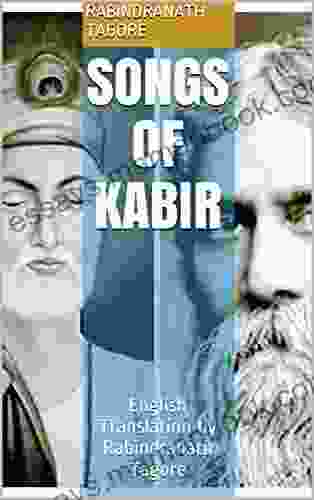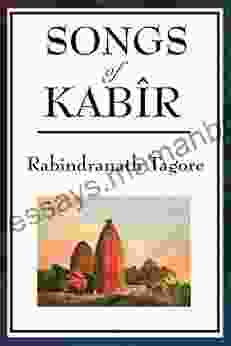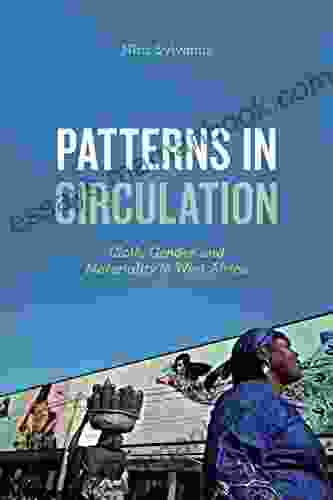Songs of Kabir and Rabindranath Tagore: Echoes of Spirituality, Love, and the Human Condition

4.3 out of 5
| Language | : | English |
| File size | : | 339 KB |
| Text-to-Speech | : | Enabled |
| Screen Reader | : | Supported |
| Enhanced typesetting | : | Enabled |
| Print length | : | 65 pages |
In the vast tapestry of Indian literature, the songs of Kabir and Rabindranath Tagore stand out as luminous threads, weaving together the colors of spirituality, love, and the human condition. Their lyrics, profound and lyrical, have resonated with generations, crossing boundaries of time and culture.
Kabir: The Unbound Mystic
Kabir, a 15th-century mystic and poet, was known for his unconventional teachings and enigmatic verses. His songs, often set to traditional Indian melodies, are a testament to his deep spiritual insights and his iconoclastic nature.
Kabir rejected the rigidities of organized religion, embracing instead a universal path to the divine. His songs are filled with paradoxical imagery and earthy metaphors, expressing his belief in the unity of all beings and the futility of external rituals.

Song of the Weaver
"The weaver weaves a wonderful web, But knows not who wears it."
In this song, Kabir draws a parallel between the divine and the human. The weaver, like God, creates something beautiful and mysterious, but may not fully comprehend its purpose or the impact it will have on others.
Kabir's songs often explore the themes of duality and the illusion of separateness. He believed that the true self is beyond the confines of the ego and that only through self-realization can one break free from the bonds of ignorance.
Rabindranath Tagore: The Poet of Humanity
Rabindranath Tagore, a Nobel laureate and one of the most celebrated writers of the 20th century, was a poet, musician, and social reformer. His songs, known as "Rabindra Sangeet," are an expression of his deep humanism and his unwavering faith in the power of love.
Tagore believed in the inherent divinity of every individual and the importance of compassion and empathy. His songs celebrate the beauty of nature, the joys and sorrows of everyday life, and the enduring bonds of human connection.

Where the Mind is Without Fear
"Where the mind is without fear and the head is held high; Where knowledge is free; Where the world has not been broken up into fragments by narrow domestic walls; Where words come out from the depth of truth; Where tireless striving stretches its arms towards perfection;..."
This song, which was later adopted as India's national anthem, is a fervent plea for a world free from fear, ignorance, and division. Tagore believed that education, compassion, and a deep connection to one's inner self are essential for creating a just and harmonious society.
Tagore's songs are also known for their lyrical beauty and musicality. He skillfully combined traditional Indian melodies with Western harmonies, creating a unique and enchanting sound that continues to captivate audiences today.
Shared Themes and Resonances
While Kabir and Tagore lived in different centuries and belonged to distinct literary traditions, their songs share several profound themes and resonances:
- Spirituality: Both Kabir and Tagore believed in the inherent divinity of all beings and the importance of seeking a connection with the divine.
- Love: Their songs celebrate the power of love in all its forms, from romantic love to human compassion and divine love.
- Humanity: They wrote about the joys and sorrows of human existence, recognizing the challenges and triumphs that we all face.
- Social Justice: Both Kabir and Tagore were concerned with social inequality and injustice. Their songs often called for a more just and compassionate world.
- Universality: Their songs transcend cultural and religious boundaries, speaking to the universal human experience.
Contemporary Interpretations and Legacy
The songs of Kabir and Rabindranath Tagore continue to be performed and interpreted by musicians around the world. Their timeless wisdom and universal appeal have made them a cherished part of Indian culture and a source of inspiration for artists and seekers alike.
Contemporary musicians have reimagined these songs in various styles, from classical Indian music to folk and contemporary pop. This has helped to bring their message to new audiences and foster a deeper appreciation of their artistry.
The songs of Kabir and Rabindranath Tagore are a testament to the transformative power of words and music. Through their profound lyrics and timeless melodies, they have touched the lives of countless people, offering solace, inspiration, and a deeper understanding of the human condition.
As we navigate the complexities of modern life, it is more important than ever to draw upon the wisdom and beauty of these songs. They remind us of our shared humanity, the importance of compassion and love, and the enduring power of the human spirit.
4.3 out of 5
| Language | : | English |
| File size | : | 339 KB |
| Text-to-Speech | : | Enabled |
| Screen Reader | : | Supported |
| Enhanced typesetting | : | Enabled |
| Print length | : | 65 pages |
Do you want to contribute by writing guest posts on this blog?
Please contact us and send us a resume of previous articles that you have written.
 Top Book
Top Book Novel
Novel Fiction
Fiction Nonfiction
Nonfiction Literature
Literature Paperback
Paperback Hardcover
Hardcover E-book
E-book Audiobook
Audiobook Bestseller
Bestseller Classic
Classic Mystery
Mystery Thriller
Thriller Romance
Romance Fantasy
Fantasy Science Fiction
Science Fiction Biography
Biography Memoir
Memoir Autobiography
Autobiography Poetry
Poetry Drama
Drama Historical Fiction
Historical Fiction Self-help
Self-help Young Adult
Young Adult Childrens Books
Childrens Books Graphic Novel
Graphic Novel Anthology
Anthology Series
Series Encyclopedia
Encyclopedia Reference
Reference Guidebook
Guidebook Textbook
Textbook Workbook
Workbook Journal
Journal Diary
Diary Manuscript
Manuscript Folio
Folio Pulp Fiction
Pulp Fiction Short Stories
Short Stories Fairy Tales
Fairy Tales Fables
Fables Mythology
Mythology Philosophy
Philosophy Religion
Religion Spirituality
Spirituality Essays
Essays Critique
Critique Commentary
Commentary Glossary
Glossary Bibliography
Bibliography Index
Index Table of Contents
Table of Contents Preface
Preface Introduction
Introduction Foreword
Foreword Afterword
Afterword Appendices
Appendices Annotations
Annotations Footnotes
Footnotes Epilogue
Epilogue Prologue
Prologue James Traub
James Traub Mick Herron
Mick Herron Sarah Smarsh
Sarah Smarsh Seth Kubersky
Seth Kubersky Beatriz Brum
Beatriz Brum Lawrence Durrell
Lawrence Durrell Vidya Vasudevan
Vidya Vasudevan Mike Shelton
Mike Shelton Vera Brittain
Vera Brittain Adrian Ernesto Cepeda
Adrian Ernesto Cepeda William C Foster
William C Foster Julian Richer
Julian Richer Melinda Leigh
Melinda Leigh Nikki Van De Car
Nikki Van De Car Miranda Leigh
Miranda Leigh R J Patterson
R J Patterson Joanie Eppinga
Joanie Eppinga Adolph Caso
Adolph Caso Angela Castillo
Angela Castillo Shiloh Walker
Shiloh Walker
Light bulbAdvertise smarter! Our strategic ad space ensures maximum exposure. Reserve your spot today!

 Martin CoxSongs Of Kabir English Translation By Rabindranath Tagore: A Journey into the...
Martin CoxSongs Of Kabir English Translation By Rabindranath Tagore: A Journey into the...
 Ryūnosuke AkutagawaThe Clarinet Polka Clarinet Quintet Choir Score: A Comprehensive Guide
Ryūnosuke AkutagawaThe Clarinet Polka Clarinet Quintet Choir Score: A Comprehensive Guide
 Nathaniel PowellUnlocking the Power of Prosperity: A Comprehensive Guide to Cultivating a...
Nathaniel PowellUnlocking the Power of Prosperity: A Comprehensive Guide to Cultivating a... Yasunari KawabataFollow ·18.1k
Yasunari KawabataFollow ·18.1k Kazuo IshiguroFollow ·7k
Kazuo IshiguroFollow ·7k Jamie BlairFollow ·11.3k
Jamie BlairFollow ·11.3k Thomas MannFollow ·15.2k
Thomas MannFollow ·15.2k Don ColemanFollow ·12.4k
Don ColemanFollow ·12.4k Tim ReedFollow ·7.5k
Tim ReedFollow ·7.5k Samuel BeckettFollow ·8.6k
Samuel BeckettFollow ·8.6k Dwayne MitchellFollow ·17.2k
Dwayne MitchellFollow ·17.2k

 Dean Butler
Dean ButlerBlack Widow 2024: A Comprehensive Guide to Kelly...
In 2024, Marvel...

 Gage Hayes
Gage HayesNothing and the Speck: An In-Depth Analysis of Yana...
Yana Toboso's works, particularly the manga...

 Stan Ward
Stan WardThe Best American Poetry 1997: James Tate
The Best American Poetry...

 Corey Green
Corey GreenThe Chance of Home: Exploring the Poetic Landscape of...
Immerse yourself in the evocative world of...
4.3 out of 5
| Language | : | English |
| File size | : | 339 KB |
| Text-to-Speech | : | Enabled |
| Screen Reader | : | Supported |
| Enhanced typesetting | : | Enabled |
| Print length | : | 65 pages |









